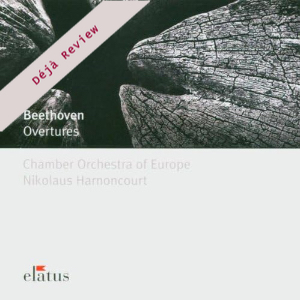
Déjà Review: this review was first published in March 2005 and the recording is still available.
Ludwig van Beethoven (1770-1827)
Overtures
Coriolan, Op.62
Creatures of Prometheus, Op.43
Ruins of Athens, Op.113
Fidelio, Op.72
Leonore 1, Op.138
Leonore 2, Op.72
Leonore 3, Op.72
Egmont, Op. 84
Chamber Orchestra of Europe/Nikolaus Harnoncourt
rec. 1993/96, Stefaniensaal, Graz; Musikverein, Vienna; Concert Hall, Athens
Elatus 2564 61779-2 [76]
This thrilling disc of Beethoven overtures garnered considerable critical praise on its first appearance on Teldec a few years ago, being chosen as Gramophone disc of the month at the time. If you know Harnoncourt’s Beethoven symphony cycle with the same orchestra, you will know what to expect. If you don’t, you’ll be in for an invigorating experience if you buy this well filled disc in its new mid-price format.
The overtures often appear as fillers for symphony recordings, but conductors and record companies have, over the years, been wise to the fact that there is so much good music in these works that they can easily stand alone in compilations. Thus Harnoncourt does not have the field to himself by any means. The selections vary, but the only really ‘complete’ sets (including the later rarities such as King Stephen or The Consecration of the House and other fillers) spill over onto two discs, as with ‘twofers’ from Karajan and Marriner. Even though Harnoncourt is using a modern orchestra, his chief competition may be with Roy Goodman’s Hanover Band set on Nimbus (at least in matters of phrasing and tempos) which interestingly includes those two late works at the expense of Leonore 1 and 3. Some might argue this makes for a more interesting selection, but it is very revealing to hear the three Leonore overtures in sequence. Harnoncourt’s disc is certainly fuller than Colin Davis and the Bavarian RSO (Sony) or Jochum and the Bamberg SO (RCA), and I have to say I’m not sure of the availability of the Nimbus disc.
The playing and conducting really are electrifying here. The opening item, Coriolan, has tremendous presence, the big orchestral chords at the start hammered out with real precision and force. Towards the climax, the momentum builds unerringly with horns and natural trumpets gloriously blaring out above the texture. Harnoncourt’s concern for textural clarity is evident at the start of Prometheus, where we can clearly discern Beethoven’s harmonic structure. Douglas Boyd’s oboe playing is a delight, especially in The Ruin of Athens, as is the quality of the horn section throughout. Tempos are generally quick, rhythms all well sprung, and everything has the sort of energy and inner life that we have some to expect from this source. It’s fascinating to hear the changes Beethoven made in his Leonore overtures, both in structure and orchestration. Some may miss the weight of the Berlin Phil in Egmont, but I was just bowled over by the crispness of attack and superbly judged pacing, to say nothing of the quality of general ensemble playing.
This is Beethoven conducting of a very high order, with an orchestra prepared to follow every nuance and inflection. Nothing seems forced or unnatural, and there is an awesome sense of scale and cumulative power that gets to the very heart of the composer. All except one item are ‘live’ but with no audience distraction, and the recording quality is very good indeed, with plenty of depth and detail. Excellent liner notes complete a very handsome issue. There’s some great music here, so go and treat yourself.
Tony Haywood
Help us financially by purchasing from



















